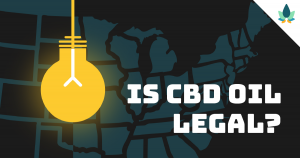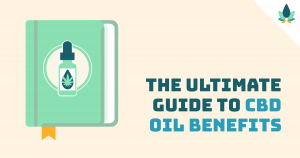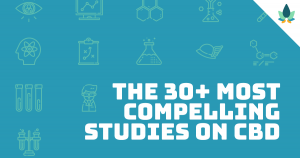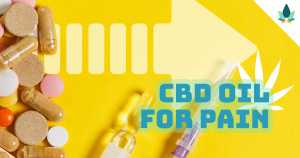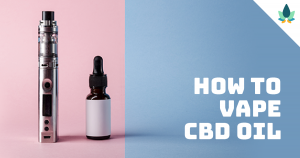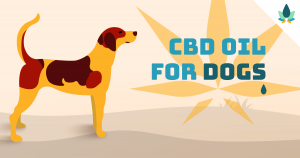Wondering what the differences are between CBD vs THC?
CBD oil has quickly become a popular supplement but is associated with marijuana because, like THC, it comes from the cannabis plant. However, because CBD comes from cannabis, there’s a lot of confusion and false information about it.
This article will clear all of that up and explain exactly what the differences are between THC and CBD, what each of them is used for, bust some common myths, and answer some frequently asked questions.
Why trust us? Most of the information out there on CBD is written for scientific journals, by companies trying to sell you something, or by trendy sites only interested in this week’s buzzword. Our goal is to provide the most accurate information about CBD and do all the research so you don’t have to. Read more here.
Now then, let’s get started!
What Is CBD?
CBD – or cannabidiol – is a type of cannabinoid. Cannabinoids are chemicals that are naturally found in cannabis plants. This is where people typically get concerned.
Note that CBD does NOT get you high.
It has many medical benefits and its primary effects (as you’ll soon learn) include pain relief, anxiety reduction, and a ton of other great things.
If you want to learn more about CBD products and CBD oil, read our full “What is CBD?” explanation.

What Is THC?
THC – or Delta (9)-tetrahydrocannabinol – is also a type of cannabinoid. However, this is the chemical that causes you to experience the “high” that’s associated with recreational and medical marijuana. You know, pot! (1)
Due to THC’s psychoactive qualities, it is known to provide a high that can be either euphoric or accompanied by paranoia and other negative effects, depending upon the strain and user.
CBD vs. THC: Medical & Recreational Uses
THC and CBD both have incredible medical benefits, which is why medical cannabis is beginning to see legalization, in the US.
Let’s break it down.
CBD Medicinal Uses

SEIZURE RELIEF.
CBD oil is gaining popularity in treating epilepsy due to its potential to reduce the frequency and severity of seizures for sufferers of various forms of epilepsy without the negative side effects of more commonly prescribed treatments. New drugs have been both put into clinical trials and approved by the FDA for the treatment of seizures by harnessing the power of CBD.

LESSENED ANXIETY.
Unlike its counterpart THC, which can heighten anxiety, CBD can interact with the endocannabinoid system to reduce anxiety, even for long-time sufferers, leading to a better overall quality of life and daily functioning.

PAIN RELIEF.
11.2% of Americans suffer from chronic pain. Of those, 17% suffer from severe pain levels on a daily basis. Because pain can often be traced back to inflammation, CBD’s anti-inflammatory effects may be a natural treatment option, free of the side effects of over-the-counter painkillers. (2 , 3). A new cannabis-containing drug – Sativex – has been approved by the FDA for the treatment of neuropathic pain in MS patients. It’s expected that other pain-relieving drugs are forthcoming.

NEUROLOGICAL CONDITION TREATMENT & RELIEF.
Neurological conditions like Alzheimer’s are often linked with devastating side effects, including a reduced sense of recognition and overall cognitive functioning. Recent studies have indicated that CBD may be able to lessen these effects. (4)

TUMOR SHRINKING CAPABILITIES.
Recently, studies have indicated that CBD oil may be effective for shrinking tumors in the body and stopping the spread of malignant cells. (5)

NAUSEA RELIEF.
CBD has been recognized for some time for its ability to reduce nausea and increase appetites in those suffering due to medical disorders or reactions to common disease treatment protocols.

COUNTER DRUG AND SMOKING WITHDRAWAL EFFECTS.
Smoking cessation and opioid withdrawal symptoms are serious hindrances to moving forward. Recent studies have suggested CBD oil may help relieve withdrawal symptoms, leading to more successful treatment and cessation. (6)

PANCREATIC BENEFITS FOR TYPE-1 DIABETICS.
At its core, Type 1 Diabetes is an immune disorder that occurs when an individual’s immune system attacks the pancreas. CBD oil may help in reducing the resulting inflammation of the pancreas, allowing for better management of the disease. (7)

ACNE TREATMENT.
Acne, like many other conditions, begins with inflammation and the overproduction of specific chemicals in the body. With the help of CBD oil, acne could become less severe.
These are just a few of the research-backed benefits of CBD oil. As the supplement gains popularity, other notable benefits are likely to be recognized.
CBD Recreational Uses
While THC is often used recreationally to produce a “high” effect, the use of CBD oil does not have any psychoactive effects and thus is not normally used recreationally.
THC Medicinal Uses
THC and medical marijuana have many of the same health benefits as CBD oil, including:

PAIN RELIEF.
Like CBD oil, THC has pain-relieving properties that can be used for chronic or temporary pain. It reduces the pain signals at the site of injury by blocking the inflammatory process itself or the signals that are elicited.

NEUROLOGICAL CONDITION TREATMENT & RELIEF.
THC can help ease symptoms of neurological conditions such as Multiple Sclerosis (MS), Tourettes, and more. (8)

TUMOR-SHRINKING & ANTI-CANCER CAPABILITIES.
THC induces autophagy-mediated cell death through stimulation of ER stress in human glioma cells. In other words, it kills cancer cells. (9)

NAUSEA RELIEF.
THC has also been shown to help relieve nausea. In fact, a synthetic THC, called Marinol or Dronabinol, used to be prescribed for nausea.(10)
The only medicinal use THC has that CBD oil does not is in the use of psychotherapy. Due to the psychoactive effects of THC, therapists may be able to use it to help treat PTSD and anxiety disorders, although the research isn’t clear yet. That said, CBD oil has also been shown to treat PTSD and anxiety orders without the use of psychotherapy.
Keep in mind that the benefits of THC aren’t without their drawbacks and risks, as you’ll learn in the section on side effects. Additionally, while state laws on THC use have begun to become more liberal, federal law in the United States still bans THC as a category 1 substance.
THC Recreational Uses
THC is most well-known for its mind-altering psychoactive effects, and is often used to “get high”.
Depending on the person and strain used, these effects can either elevate your mood and give you energy (typically accompanied with a “Sativa” strain) or cause you to feel lethargic, hungry, and relaxed (typically an “Indica” strain).
The Entourage Effect
While THC and CBD can be extracted from cannabis plants independently of one another, they may not be effective as standalone products for each individual’s needs.
Using them together may increase their effectiveness. This is because of something called the entourage effect.
The entourage effect is when “whole” products, like plants, are used to boost the effectiveness of any individual component or compound. In some cases, when THC and CBD are used together, an individual may feel more relief than using them on their own.
For many users, finding the right combination of CBD and THC can take time and a little experimentation; that’s because “whole plant” science is still in the early phases of research. Finding a standard dose can also be a challenge due to varying CBD and THC content in a given plant strain. If CBD does not create the relief you’re searching for, finding a balance between CBD and THC may be what works best for your individual needs.
CBD vs. THC: Side Effects
The side effects of THC and CBD are not yet fully understood. Because of the War on Drugs and the stigma associated with cannabis and medical marijuana, research is really only just beginning.
For example, the first study on the benefits of cannabis for veterans with PTSD started in 2017 and only happened after years of struggling through red tape and risking the careers of researchers. (11)
That said, here’s what we currently know about these substances’ side effects.
CBD Side Effects
CBD oil has very few, if any, known side effects.
One study done in 1986 gave CBD oil to 5 patients with dystonic movement disorders (muscle tremors and other forms of uncontrollable movements). The study’s authors, Paul Consroe, Reuven Sandyk, and Stuart R. Snider, found that CBD’s side effects “were mild and included hypotension [low blood pressure], dry mouth, psychomotor slowing [slowed thoughts or movements], lightheadedness, and sedation.” (12)
dystonia, it worsened effects of Parkinson’s Disease in 2 of the 5 patients. A newer study from 2015, however, found that CBD oil actually has potential benefits for Parkinson’s patients. (13, 14, 15, 16)
Another study did much earlier in 1980 on 8 healthy volunteers and 15 patients with epilepsy looked at the side effects of daily consumption of CBD oil for 30 days. They cited that “All patients and volunteers tolerated CBD very well and no signs of toxicity or serious side effects were detected on examination.” (17)
So, while the research is still sparse, there are no confirmed side effects of CBD oil at this time. However, only time will tell.
THC Side Effects
Unlike CBD oil, THC has been (slightly) more researched and is known to have quite a few side effects, including:

INCREASED SUSCEPTIBILITY TO PSYCHOSIS.
Cannabis-induced psychosis (CIB) is a medical term for cannabis ingestion causing psychosis. Patients with CIB also tended to have an increase in schizophrenia-spectrum disorders. (18)

INCREASED HEART RATE.
THC is known to increase heart rate. This is because it is a vasodilator (it makes your blood vessels expand). Expanded vessels can lower your blood pressure, potentially causing your heart to speed up to compensate. (19)

COORDINATION PROBLEMS.
THC affects the cortico-striatal networks, which are essential for motor control and coordination. (20)

DRY MOUTH.
Marijuana causes dry mouth (or “cotton mouth”) because THC binds to receptors in the salivary glands and causes them to be less active. It’s possible this can be avoided if THC is ingested as food rather than smoked, however. (21)

RED EYES.
Because THC lowers blood pressure, it causes blood vessels and capillaries to dilate. This results in the telling sign of being “high” – bloodshot eyes.

SLOWER REACTION TIMES.
If you ever have a conversation with someone who’s under the influence of THC, you may have noticed they’re slower to answer and even to move. Our brains have a network called the thalamo-cortico-striatal circuit, which is related to our perception of time. This network contains receptors that bind with THC, and researchers believe that when this happens our internal clocks speed up, thus creating the feeling that the world around you has slowed down. (22)

MEMORY LOSS.
Your cells have something called “mitochondria”, which essentially supply power to them. One study found that a cannabinoid called CB1 can bind with mitochondria in your hippocampal neurons (the hippocampus being the region of your brain responsible for memory), which in turn causes memory loss. However, it’s not currently understood if these effects are long-lasting or only temporary. (23)
All that said, keep in mind that although it’s had more research than CBD oil, and cannabis products are gaining in popularity, very little study has been done on the side effects of THC, and there’s still a lot we don’t know.
CBD vs. THC: Chemical and Molecular Structure
The first time CBD was isolated was in 1940 and THC was isolated in 1964 by the pioneering cannabis scientist Raphael Mechoulam. CBD was discovered after identifying cannabidiol acid, or CBDA, which is a non-intoxicating, acidic precursor to CBD.
CBD and THC have the exact same chemical structure: 21 carbon atoms, 30 hydrogen atoms, and 2 oxygen atoms. However, these molecules are arranged differently, and that’s why they affect you so differently.
On paper, they look like this:

Both of these compounds are chemically similar to your body’s own endocannabinoids. This allows THC and CBD to react with your cannabinoid receptors; your body’s endocannabinoid receptors don’t know the difference.
In the endocannabinoid system, CB1 and CB2 are the most important cannabinoid receptors.
CB1 receptors are found mostly in the brain and play an important role in feeling pain, sleep, appetite, memory, mood, and more.
CB2 receptors, are usually found in the immune system and are responsible for anti-inflammatory effects of cannabis.
While CB1 and CB2 receptors are the most commonly recognized receptors for CBD, THC and other cannabinoids, others, like g protein-coupled receptors have started coming to light. These lesser studied and lesser-known receptors also seem to bind to cannabinoids, producing positive effects throughout the body.
When your body absorbs these cannabinoids, they impact your central nervous system by releasing neurotransmitters in your brain.
Neurotransmitters are chemicals that relay messages between your cells. CBD and THC bind to different receptors and that’s why they have very different effects on the human body. Because these receptors are designed to interact with cannabinoids, the medicinal use of CBD and/or THC seems to be a common-sense next step for many individuals.
Frequently Asked Questions
Now that you know the differences between THC vs CBD, you may have a few questions. Some of the most common questions we get are below.
Does CBD show up on drug tests?
The short answer? No.
The longer answer? CBD oil does not show up on drug tests unless you take a lot of it in one day – you’d have to take 1,000-2,000 mg for it to show up. But even then, it would be a false positive (meaning it won’t show true THC and you’ll have to be retested). Hemp-based CBD should contain only trace amounts of THC, helping in this regard. If, however, a CBD product contains high levels of THC, the drug test will be positive for THC. How long it remains in your system varies, as the half-life is dependent upon how frequently it is consumed.
Will CBD get you high?
No, CBD oil will not get you high.
As we covered above, there are non-psychoactive compounds in CBD. As long as you’re taking pure CBD oil with no THC, you won’t get any high effect.
What does `CBD` stand for?
CBD stands for cannabidiol, which is one of over a hundred cannabinoids found in cannabis and hemp plants.


